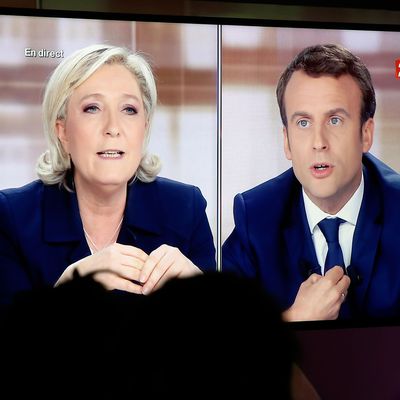
If Hillary Clinton’s return to the airwaves and Donald Trump’s response-tweeting have got you nostalgic for the acrimony and nauseating tension of the 2016 debate season, consider watching the full two-and-a-half-hour political spectacle that played out in France yesterday.
In advance of Sunday’s vote in that country’s presidential contest, far-right candidate Marine Le Pen squared off against independent ex-Socialist Emmanuel Macron in the first and only debate between the two finalists. And we do mean squared off: The TV format seated the two face-to-face, separated only by their desks. As anyone who lived through 2016 could have predicted, the moderator lost control, and the occasion spun into a fury of interruptions and insults: “smirking banker,” “parasite,” “priestess of fear.” The only thing missing was a direct threat of imprisonment.
Le Pen came prepared with a comprehensive economic narrative and attacked Macron as the instrument of big business, Eurocrats, and Islamists. French center-right newspaper Le Monde called this narrative “a brainwashing,” identifying 19 separate falsehoods, and suggested that it was “done deliberately, in order to prevent a debate over fundamentals and to force Macron to respond to her often false attacks.” Le Monde also, in case you were wondering, said that this strategy was “not without reminders of Donald Trump’s during the American campaign.”
And speaking of the American campaign, Le Pen called Russia a “great nation” and said that France should keep her distance from both Russia and the U.S. — quite a trick for a country that is a member of NATO. Macron, for his part, said that the U.S. was a key regional partner and that he would not “submit to have his behavior dictated by Mr. Putin.”
While the French people are concerned with education and penal reform, the debate instead spent a great deal of time on seemingly minor issues: Le Pen and Macron sparred, bizarrely to an American ear, over the morality of surrogate motherhood. Surrogacy is illegal in France, as in a number of European countries, and a majority of French voters support this prohibition. (You can read a French judge explaining, in English, that surrogacy commodifies women’s bodies, and that surrogates must be protected from the possibility that they might change their minds, here.) Macron’s platform proposes to regularize the status of children born to surrogates abroad and brought to France. Le Pen sought to suggest that Macron’s proposals would bring in an era of artificial procreation.
Moving from science fiction to 20th-century history, Le Pen and Macron have argued before about whether the French nation bears any responsibility for the evils of the past, such as colonialism and French collaboration with Hitler, and they obligingly returned to these themes for a television audience. Le Pen doubled down on her recent assertion that French people should feel no guilt for the infamous 1942 Vel’ d’Hiv roundup, in which French law enforcement arrested and deported more than 13,000 Jews, knowing full well what lay ahead for them.
On both these issues and others, French commentators saw Le Pen trying to seize the de Gaulle nostalgia vote, looking backward to a time in which France was great, socially conservative, and ethnically homogenous.
Macron, who has said that France bears responsibility for the sins of the past, seemed comfortable ceding that vision of the country and was not shy about playing the role of scold. His most-used phrase of the night was “you’re talking nonsense.” Some commentators wondered whether this was a mistake and a potential turnoff. But it appeared that Macron, at least, was not going for the undecided vote.
Who won, and does it matter? In a post-debate poll, 95 percent of Macron supporters thought their man had won, against only 85 percent of Le Pen partisans. The debate won’t have changed the approximately 20-point advantage Macron enjoys in opinion polls, though anxiety is still high over data suggesting that the 20 percent of the voting public who cast ballots for leftist Jean-Luc Mélenchon in the first round might sit this one out.
But Le Pen was clearly choosing her spots to bring her base to the polls this Sunday and in French legislative elections in June, which will do much to determine what program, if any, the next president of France can advance. Sarah Wildman points out that this is the first time a National Front candidate has gotten herself onstage for a one-on-one debate in France — Jacques Chirac refused to debate her father in 2002. It seems all too likely that, as her father before her, she has maneuvered her party and herself into a position from which even losing is winning.





























